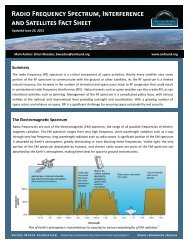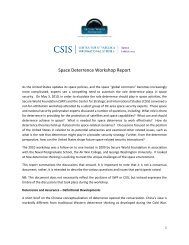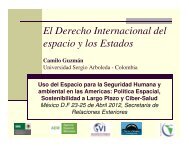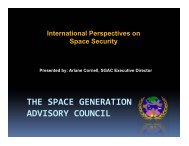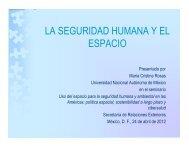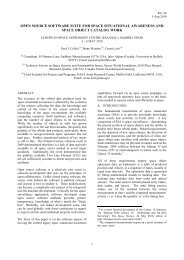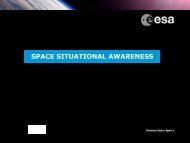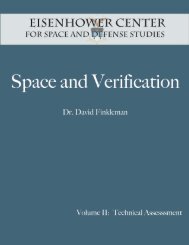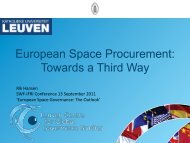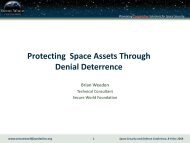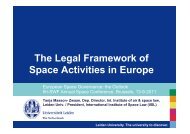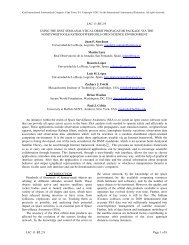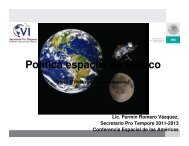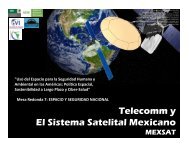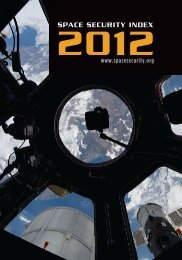Space Security Index
Space Security Index
Space Security Index
You also want an ePaper? Increase the reach of your titles
YUMPU automatically turns print PDFs into web optimized ePapers that Google loves.
order of years or decades, there are several mitigation methods that could potentially be used,<br />
consisting of constant thrust applications to gradually change the NEO’s orbit over time. If<br />
warning times are relatively short, then only certain kinetic methods can be applied. Kinetic<br />
deection methods may include ramming the NEO with a series of kinetic projectiles, but<br />
some researchers have advocated the use of nearby explosions of nuclear weapons to try and<br />
change the trajectory of the NEO. However, this method would create additional threats to<br />
the environment and stability of outer space and would have complex technical challenges<br />
and policy implications.<br />
As of July 2011, there are 8,037 known NEAs, 828 1 km in diameter or larger. 118 e number<br />
of NEOs is expected to jump to over 10,000 in the next 15 years, requiring international<br />
decision-making on those objects that present a threat. As a result, focus is now shifting<br />
toward governance for NEO detection and mitigation.<br />
2010 Development<br />
International awareness of the NEO problem and discussions on solutions continue to increase<br />
On 15 October, the Director of the Oce of Science and Technology Policy in the White<br />
House sent a formal letter to both houses of Congress that outlined U.S. government<br />
activities, procedures, roles, and responsibilities in responding to the NEO impact threat. 119<br />
e letter detailed historical, current, and future NEO detection and tracking programs and<br />
compliance with Congressional direction. 120 It also detailed the domestic and international<br />
notication procedures in the event a threatening asteroid is detected, and the emergency<br />
response procedures to mitigate an impact.<br />
At the end of October, a workshop was held at the ESA oces in Darmstadt, Germany,<br />
to discuss NEO deection mission planning and operations. 121 e event was organized by<br />
the Secure World Foundation and the Association of <strong>Space</strong> Explorers in cooperation with<br />
ESA. e workshop brought together technical and policy experts from several national<br />
space agencies and focused on the interagency communication and coordination necessary to<br />
deect threatening asteroids. A workshop report summarized the group’s recommendations,<br />
which were presented to the UN COPUOS Action Team 14 on NEOs. 122<br />
In November it was reported that the U.S. DOD was still working on providing data<br />
collected by military satellites on bolides to the NEO science community. 123 Military<br />
satellites designed to detect missile launches and explosions can also detect asteroids entering<br />
the Earth’s atmosphere. e data on asteroid impacts is unclassied and in the past was<br />
provided to the NEO science community, but such information sharing ceased several years<br />
ago. e Chief of <strong>Space</strong> and Cyberspace Operational Integration stated that work is still<br />
ongoing to determine how best to share the bolide data, and where the resources to do so<br />
will come from. 124<br />
<strong>Space</strong> <strong>Security</strong> Impact<br />
An understanding of the potential threat posed by NEOs has begun to move from the<br />
astronomy community to the broader policy community. Discussions and progress on<br />
international detection, warning, collaboration, and decision-making are a positive step for<br />
space security, although follow-through is still lacking. e establishment of international<br />
governance mechanisms to respond to the NEO threat will likely prove benecial in other<br />
areas of space security.<br />
The <strong>Space</strong> Environment<br />
43



